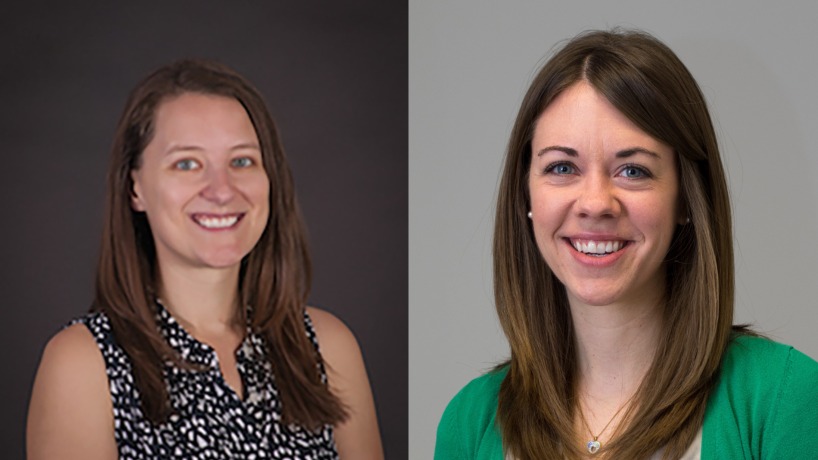
Emily Oliveira (left), an assistant clinical professor in the College of Education and director of the Counseling and Social Advocacy Center at UMSL, and Rachel Taube, project director for Mental Health First Aid at the Missouri Institute of Mental Health, collaborated on a mental health seminar aimed at future teachers. During a daylong session held in November, 60 teacher candidates from the College of Education worked with Taube’s team to earn certification in Mental Health First Aid, an international, evidence-based program. (Photos courtesy of Emily Oliveira and Rachel Taube).
When it comes to the classroom, teachers do more than plan lessons and grade papers. They also provide support and encouragement to students and are often the first to notice when their students experience changes or challenges with their mental health.
The amount of time educators spend with young people on a day-to-day basis puts them in a unique position to intervene during crisis and non-crisis mental health situations.
This idea led Rachel Taube, project director for Mental Health First Aid at the Missouri Institute of Mental Health at the University of Missouri–St. Louis, and Emily Oliveira, assistant clinical professor in the College of Education and director of the Counseling and Social Advocacy Center at UMSL, to collaborate on a mental health seminar aimed at future teachers.
During a daylong session held in November, 60 teacher candidates from the College of Education worked with Taube’s team to earn certification in Mental Health First Aid, an international, evidence-based program operated in the United States by the National Council for Mental Wellbeing in partnership with the Missouri Department of Mental Health.
Taube’s team at MIMH supports 400 instructors around the state who have certified more than 60,000 people in Missouri More than 2 million have attended trainings nationwide. Of all those her team has trained, UMSL students made a particularly strong impression.
“I was really impressed,” she said. “The students stood out in terms of their level of preparation, engagement and enthusiasm for the topic.”
The seminar also included a keynote address and four breakout sessions on mental health topics run by counseling doctoral students. Between two certification classes and the breakout sessions, more than 180 UMSL students participated, and Oliveira noted they remained highly engaged throughout the day.
The event grew from a grant proposal Oliveira and Taube collaborated on near the start of 2021. The grant was for mental health awareness training, and Oliveira had the idea to include teacher candidates in the proposed training sessions.
“We were just thinking who might benefit from a little bit more awareness about mental health, and we thought teacher candidates were really prime – in part related to COVID and all of the stressors that teachers and schools are facing but also really just in general, too,” Taube said.
Unfortunately, the grant wasn’t funded, but the pair kept working on the idea and eventually found resources to put on November’s seminar. For the certification sessions, they decided to focus on Youth Mental Health First Aid, a course specifically geared toward helping adults, such as parents and teachers, recognize signs and symptoms of mental health concerns in adolescents.
The course reviews typical adolescent development and introduces common mental health challenges for young people and topics such as anxiety, depression, eating disorders and substance use.
It also lays out a five-step action plan to help young people in crisis and non-crisis situations. The process asks adults to assess the risk of the situation, listen nonjudgmentally, give reassurance and information and encourage professional help, as well as self-help.
Oliveira said it’s critical for teachers to have these tools because students aren’t immune from mental health struggles, but unlike adults, they might not know how to deal with stressors or ask for help.
“Maybe they can’t voice it,” Oliveira said. “Maybe they can’t say, ‘I’m feeling really sad right now’ or ‘I’m feeling really angry’ or ‘This traumatic thing happened at home last night, so I didn’t get very much sleep.’ Being able to identify mental health concerns in students and then support them and maybe do a referral to a school counselor or school psychologist or school social worker, being aware that those services even exist, is really important for educators.
“Then if they do have a student who’s experiencing some kind of concern, they can be referred to the appropriate resource at their school, versus what we sometimes see is they will be punished because whatever is happening for them mentally may present itself as a behavioral concern. So, then children or adolescents are being penalized or punished for a natural response to a mental health trigger.”
During the breakout sessions, doctoral counseling students presented on topics related to their research and areas of expertise. One session focused on multiculturalism and how educators can incorporate and be mindful of different cultures in the classroom. Another centered on supporting and calming students who have experienced trauma. A third session dealt with substance use in children and adolescents, while the final presentation of the day covered the importance of self-care for educators.
Overall, Oliveira and Taube thought the seminar was a resounding success and were glad to highlight how the schools can benefit from mental health awareness on a day-to-day basis
“The skill building really helps folks who might notice a student in their classroom who’s acting a little bit down today,” Taube said. “It may not be a crisis. It may just be typical adolescent development stuff going on, but it’s still really powerful to have a teacher who notices that in you and feels comfortable responding. I think a lot of times we want to do the right thing. We want to help, but we just don’t quite know what to say or how to start those conversations about mental health. So, it’s really a very practical, skill-based approach.”














